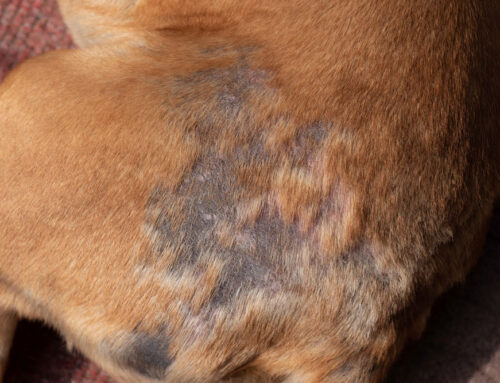Allergens may never completely die off here in Alabama—they just change a little with the seasons. That means our pets can feel the itch of allergy symptoms year-round. Allergens are divided into four main groups: contact, environmental, food, and flea. Some pets suffer from all four, so it can be tricky to pinpoint their specific allergens and know how to avoid them.
Contact allergens
One of the least common allergies, contact allergies are usually caused by chemicals that have come in contact with your pet’s skin. Narrowing in on the culprit can be difficult, since it may take up to 48 hours for signs to appear. Some contact allergens include:
- Soaps
- Shampoos
- Carpet
- Household cleaners, deodorizers, detergents, or floor products
- Plastics
- Rubber
- Concrete
- Metal
- Leather
- Creams or lotions
- Insecticides
Contact allergies usually manifest around the area of contact. Redness and irritation around paws and the back of the neck often occur when pets step on irritants or we apply flea prevention. Another common contact allergen is caused by using plastic food and water dishes. Cats are especially prone to developing this intolerance to plastic.
Environmental allergens
Also called inhalant allergies, seasonal allergies, atopy, and atopic dermatitis, this type of allergy is caused by inhaling an allergen. Dogs can be genetically predisposed to environmental allergies and are more likely to suffer from them than cats. One highly susceptible breed to environmental allergies is the English bulldog. These pups can be walking masses of itchy hot spots, hair loss, ear infections, and skin fold dermatitis.
Some environmental allergens include:
- Mold
- Grasses
- Trees
- Weeds
- Pollens
- Dust mites
- Mildew
Plant pollens tend to cause seasonal allergies, while some, such as dust mites, are problematic year-round.
Food Allergens
Food allergies in pets are actually quite rare. For pets who do suffer from food allergies, a food sensitivity develops when the immune system overreacts to a particular protein. Often, an owner will notice that a pet suddenly develops an allergic response to the same food she’s been eating for years.
Food allergies are a little different than other allergies in how they can manifest. In addition to the standard itching, redness, and irritation, gastrointestinal upset, such as vomiting and diarrhea, can also occur.
Some common food allergens for dogs include:
- Beef
- Dairy
- Wheat
- Eggs
- Chicken
- Lamb
- Soy
Allergic cats can have problems with:
- Beef
- Dairy
- Fish
Although it’s a commonly held belief that milk and fish should be staples in a cat’s diet, the two ingredients can cause stomach upset in some cats.
Flea allergens
The signs of flea bite dermatitis are usually textbook: Fleas like to congregate at the base of tail and can sometimes cause enough irritation to create an entirely bald pet, starting from the hind end and working forward. A cat or dog with a flea allergy can be so sensitive to the saliva from a flea bite, it can take only one flea to cause a dramatic allergic response.
Treating pets with allergies
Knowing a pet is allergic but not knowing what the pet is allergic to can be frustrating for the pet, the pet owner, and the veterinary team. Nailing down the allergen can be quite difficult, especially if multiple factors are involved. To pinpoint the cause of a pet’s allergies, it’s helpful to have a good history. When were signs noticed? What were the conditions surrounding those signs?
Depending on whether your pet has a flea, food, environmental, or contact allergy, the goal is the same: avoid exposure to the allergen. The more a pet is exposed to an allergen, the more intense and longer-lasting the allergic response becomes. If exposure is impossible—like exposure to dust mites—attempting to alleviate the immune response is necessary for your pet’s comfort.
Common treatments for allergies include:
- Corticosteroids
- Antihistamines
- Prescription diets
- Shampoos, lotions, and sprays
- Antibiotics for skin and ear infections
- Immunotherapy injections
- Flea prevention
Getting to the root of your pet’s allergy issue can take some trial and error, but don’t become discouraged. Each step along the path to comfort provides valuable information to us on what works best to alleviate your pet’s itchiness, ear infections, hair loss, redness, and inflammation.
Does your pet need allergy relief? Schedule an appointment to get your furry friend some comfort.








Leave A Comment